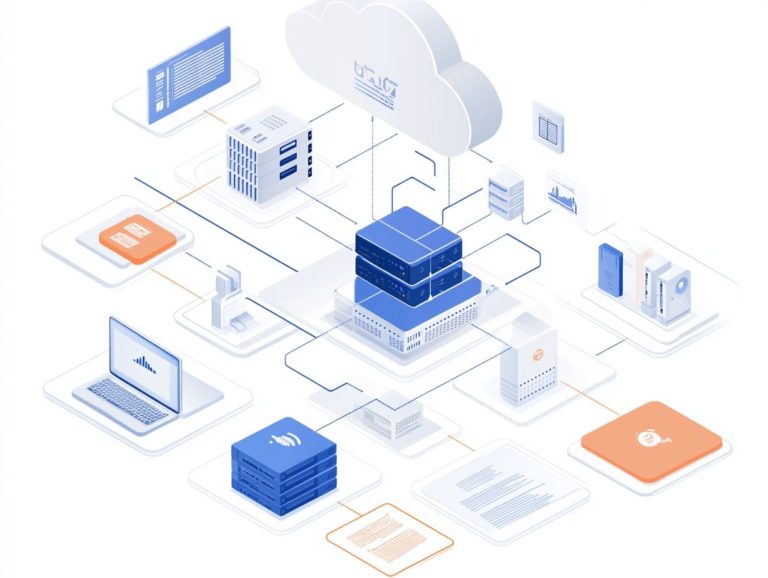What is API Management in the Cloud?
In today s fast-changing digital world, mastering API management is crucial for any business using cloud technology.
This overview explains API management, its importance, and the many benefits it offers in a cloud setting. You will learn about key parts like API gateways and developer portals, along with best practices and potential challenges.
Get ready to explore emerging trends that will shape the future of API management in the cloud. Equip yourself with knowledge to thrive in this exciting field!
Contents
- Key Takeaways:
- Understanding API Management
- Benefits of API Management in the Cloud
- Key Components of API Management in the Cloud
- Implementing API Management in the Cloud
- Challenges and Solutions for API Management in the Cloud
- Future of API Management in the Cloud
- Frequently Asked Questions
- What is API Management in the Cloud?
- Why is API Management important in the Cloud?
- What are the benefits of using API Management in the Cloud?
- How does API Management in the Cloud work?
- What are some popular API Management solutions in the Cloud?
- How can API Management in the Cloud benefit my organization?
Key Takeaways:

- API management is the process of creating, publishing, and monitoring APIs to ensure efficient communication between systems.
- Using the cloud, API management increases efficiency, scalability, and cost-effectiveness.
- Key tools include API gateways and developer portals, which streamline the API lifecycle.
Understanding API Management
API management is essential in modern software development. It allows you to manage your APIs seamlessly throughout their lifecycle.
This includes key components like API gateways, developer portals, and strong security measures that work together to improve API use and integration with backend services.
Effective API governance and thorough documentation ensure that your APIs are easy to find and secure. This caters to various API users while enhancing digital experiences.
Definition and Importance
API management involves creating, managing, and maintaining APIs to meet business goals and user needs.
This process emphasizes API security to protect sensitive data from vulnerabilities and unauthorized access.
Managing the lifecycle effectively allows for timely updates and version control, giving users seamless access to the latest features.
Comprehensive API documentation is vital. It helps developers integrate and use APIs easily.
By focusing on these elements, you can boost user satisfaction and engagement.
Benefits of API Management in the Cloud
API management in the cloud offers numerous benefits that enhance operational efficiency and scalability for businesses using cloud-native applications.
Implementing an API gateway helps manage traffic, improve performance, and achieve scalability, allowing your organization to thrive in a dynamic digital environment.
Efficiency and Scalability
A standout benefit of API management in the cloud is its ability to enhance efficiency and scalability for organizations.
This capability streamlines operations, ensuring your resources are used optimally. With effective traffic control, you can manage requests and prevent system overloads.
Load balancing helps distribute workloads across servers, increasing application responsiveness. Monitoring API performance gives you insights for proactive improvements.
You can adapt quickly to changing demands, maintaining a consistent user experience while maximizing resource use.
Key Components of API Management in the Cloud

The essential elements of API Management in the cloud are key to ensuring your APIs are effective, secure, and scalable.
This includes features like API gateways, developer portals, and powerful analytics capabilities.
These components are designed to enhance your API experience and provide seamless integration.
API Gateway
An API gateway is your central hub for managing and directing data requests between users and backend services.
This tool ensures secure and efficient communication.
With its robust functionalities, the gateway streamlines request routing and employs powerful traffic control mechanisms to maintain optimal performance.
It includes essential features like rate limiting and load balancing, which help prevent server overload and guarantee prompt responses.
The API gateway also enhances security by acting as a barrier against potential threats.
It enforces authentication and authorization protocols before any request reaches the backend services.
This effective management simplifies complexities, enhancing the overall user experience.
API Developer Portal
A developer portal is an essential interface for you, the API consumer.
It offers comprehensive documentation and resources to make API discovery and integration simple.
This platform allows you to explore various APIs while providing step-by-step guidelines, interactive samples, and best practices.
With its organized layout, the portal enhances your overall experience by ensuring you can quickly locate the information you need.
It also encourages community engagement through forums and feedback mechanisms.
This supportive ecosystem maximizes the utility of the APIs available, making your development journey efficient and enjoyable.
API Analytics
API analytics help you monitor and evaluate your API performance.
They provide valuable insights into usage statistics and overall API health.
By leveraging metrics like response times, error rates, and traffic patterns, you can streamline operations and enhance user experiences.
Understanding these key performance indicators helps you troubleshoot issues effectively and strengthens API governance.
This ensures compliance with established standards.
With detailed analytics at your fingertips, you can optimize your APIs based on usage patterns and performance trends.
Adopting this comprehensive approach is essential for staying competitive in today s data-driven market.
Implementing API Management in the Cloud
Implementing API Management in the cloud requires adopting best practices for secure and efficient API governance.
This approach aligns with your organizational strategies and integrates seamlessly with hybrid IT architectures.
Best Practices and Considerations

Adopting best practices in API management is crucial for robust API governance and security throughout the API lifecycle.
To achieve this, implement a comprehensive framework that enforces policies while providing a solid foundation for monitoring and analytics.
Effective governance involves establishing clear guidelines on how your APIs should be developed, maintained, and eventually deprecated.
By reinforcing policy enforcement, you ensure that API usage aligns with your business objectives.
Security measures like rate limiting, authentication, and encryption are essential for protecting sensitive data from unauthorized access.
Prioritizing these strategies enhances collaboration between teams and streamlines your API offerings.
This fosters innovation and agility in response to ever-changing market demands.
Act now to adopt these comprehensive approaches for a competitive edge!
Challenges and Solutions for API Management in the Cloud
API management in the cloud brings forth a range of challenges, especially in terms of security and the integration of various backend services with diverse API consumers. It’s crucial to navigate these complexities thoughtfully to ensure seamless functionality and robust protection.
Security and Integration Issues
Security and integration are big challenges in managing APIs that must be tackled to safeguard sensitive data and ensure smooth interactions between APIs. Focus on securely storing and managing API keys. Use strong authentication methods to prevent unauthorized access.
As you increasingly depend on various services to fuel your operations, it becomes vital to ensure these services communicate effectively without compromising security. Integration challenges may arise when connecting different systems, often resulting in inconsistencies in data flow and exposing potential vulnerabilities.
You can successfully navigate this complex landscape by establishing comprehensive security protocols. OAuth (an open standard for access delegation) and JWT (JSON Web Token, a compact way to securely transmit information) are examples of security protocols. Prioritize a well-defined strategy for managing API interactions and data exchange.
Future of API Management in the Cloud
Get ready to witness an exciting transformation in API management! This evolution is reshaping how you interact with and manage APIs, driven by emerging trends and technologies designed to elevate API integration and governance within cloud-native applications and microservices architectures.
Embrace these advancements, as they will redefine your API management experience in a more efficient and streamlined manner.
Emerging Trends and Technologies
Emerging trends and technologies are transforming API management, especially within the realms of cloud-native applications and microservices architecture. These innovations significantly enhance API performance and integration.
Advancements in artificial intelligence are enabling smarter routing and predictive analytics that optimize API interactions and response times. With automation tools making deployment much more streamlined, managing APIs across diverse environments becomes easier.
As you embrace advanced analytics, you ll gain deeper insights into usage patterns and performance metrics, enabling you to make more informed decisions. This shift boosts operational efficiency and paves the way for future developments in the API ecosystem, making it an exhilarating space to watch.
Watch this video to learn more about API management in the cloud.
Frequently Asked Questions

What is API Management in the Cloud?
API Management in the Cloud refers to managing an organization’s application programming interfaces (APIs) through a cloud-based platform. This allows for a centralized location for monitoring, securing, and analyzing API usage and performance.
Why is API Management important in the Cloud?
API Management in the Cloud is important because it allows organizations to efficiently and securely manage their APIs without the need for on-premises infrastructure. It also enables scalability and flexibility for handling increasing API traffic and expanding business needs.
What are the benefits of using API Management in the Cloud?
Using API Management in the Cloud can greatly enhance your security and performance right now. Some benefits include improved security, increased scalability, enhanced performance monitoring and analytics, and simplified integration with other cloud services.
How does API Management in the Cloud work?
API Management in the Cloud typically involves utilizing a cloud-based API gateway that acts as a proxy between the API and the client. This gateway handles tasks such as authentication, access control, rate limiting, and traffic management to ensure smooth and secure API communication.
What are some popular API Management solutions in the Cloud?
Some popular API Management solutions in the Cloud include Google Cloud’s Apigee, Amazon API Gateway, Microsoft Azure API Management, and IBM API Connect. These solutions offer various features and pricing options to suit different business needs.
Explore these solutions further to enhance your API management capabilities!
How can API Management in the Cloud benefit my organization?
API Management in the Cloud can significantly boost your organization. It improves security and increases developer productivity.
You ll enjoy faster and more efficient integration with external systems. It helps you control your APIs better and meet regulations.
Imagine unlocking the full potential of your APIs. Don t miss the chance to transform your operations!





